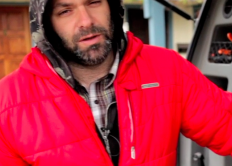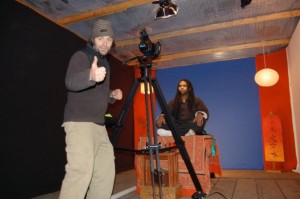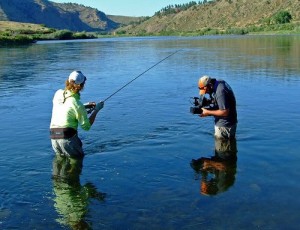Filmmaker Tim Cash, owner of FarfromEarth Films, built his own two and a half acre film ranch in Bend, Oregon. Located in the center of the state, his ranch offers studio facilities as well as the scenic beauty of the Oregon landscape. “We’ve managed to bring clients to Bend from all over the globe,” Cash says, “including Korea, Canada and the Caribbean. Bend, Oregon is an easy place to sell to people. Just send them a few pics of the Sisters, Smith Rock and neighboring waterfalls, and they are sold.”
Music Videos

Tim Cash
Recently Cash has been focusing his creative efforts almost entirely on music videos. “I love the process of music videos: the chance to be artistic and the need to come up with new and creative ideas with every project, and never do the same thing twice. I found other gigs a bit more monotonous.” Cash says that the TV shows and business promos he had been working on became pretty formulaic. “Music videos,” he says, “give me the chance to experiment with lighting, angles, color, art, direction. I feel like I learn more with every music video than I did in all the years before.”
Cash came to focus on music videomaking gradually. “At a certain point in my career about three years ago I had done quite a few music videos, but it was still just a third of the business. I was working for a TV show on the Outdoor Channel called Adventure Guides and got to travel the world and shoot and edit the series.” Cash decided to move on. “Right as the music videos were taking off I decided to quit the show and start branding myself as a music video maker.”
Building His Own Studio
Cash invested in a piece of property in Bend, Oregon. “I’ve always had this dream of creating my own little Skywalker ranch on my little property. It’s a life project. The dream is to have the first off-grid solar powered film studio in the state. Haven’t researched it but don’t think there are any around. I believe in conserving our natural resources and having full independence and freedom from corporations.”
Cash has additional goals for his studio property. He wants “to attract other film companies and indie filmmakers to rent the studios. Then build more studios and more living space for guests, so people can live and work in the same place.”
He goes on to say, “Within in the next ten years I’d love to have built the green screen room, edit bay, recording studio, two apartment dwellings and a 2,500 sq. ft. soundstage to build sets in.”
His overall dream is to create an all-inclusive filmmaking resort, with workshops and classes as well.
Practical Advantages

Cash in studio
“Over the last couple years I would have to rent studio space for projects, and on the low budgets I was working on, it didn’t seem to compute.” He wanted to own his own stage that he could shoot in whenever he wanted, without paying rental fees. “It doesn’t have to be a paid project,” he says, “and having it on my own land helps. If I get inspired to shoot something cool right then and there, I now have the spaces. As I get older I feel the need to travel less and less for work. So I thought I could make my place a destination for clients to come from out of state. Shoot music videos in Bend and stay on the property and shoot on the property. It just makes my life easier.”
Preferred Gear
On most of his video shoots, Cash uses his own cameras: the Canon 5D and 7D. “But occasionally I shoot with RED and the new RED EPIC. And they have their advantages and disadvantages. I find I can cover more ground and get more shots with the 5D. When I shoot with the RED, typically I bring in another DP with it. Sometimes I find the shots look amazing but the variety is lacking.
“With the 5D we can move swiftly through a shoot, and my crane loves flying the 5D around, as it’s virtually weightless. The REDs are just heavy and cumbersome and require more planning shots to save time. I’m personally still a huge fan of the 5D, and the price jump between the RED and 5D is so huge that it doesn’t seem (like a good investment) from a business standpoint at my low-budget level.”
Audio Capture
“One of the things I miss most about the video cameras that predate the DSLRs is being able to go XLR straight to the camera. Those were the days! Now we have to run a separate unit and sync the sound in post, which adds hours to your edit.”
“Another great thing about music videos,” he says, “NO SOUND TO WORRY ABOUT!”
When Cash is recording interviews he uses the Oktava Super-cardioid mic, plugged into the Tascam DR-100. “I love it. It gives you feature-film sound when placed properly. I also use Sennheiser Evolution wireless mics for walk and talks and doc stuff.”
Shooting the Music Video
Cash says he always uses playback to sync lips. “During ninety-nine percent of the videos I shoot the singing shots all the way through the whole song. It makes the post process so much faster, as I can drop my singing clips in the timeline, sync them to the music, then start cutting holes out of the layers.” He says that typically the band has already recorded the tune by the time they hire him.
The Edit Process
Special effects really slow down the edit process for Cash. “I can do them but they are not really where my talent lies. I love clean cinematic shots, and when you know what you’re getting the editing process can go very fast. I have been told I’m an incredibly fast editor. That said, when I start a project in the edit bay, as long as I’m the right head-space I can dive right in. I go by feeling and goose bumps alone. I don’t over think or over guess. I don’t nitpick. I just find a feeling in the song and go with that.”
Some of his videos have taken him only a day to edit. The “Signs” video, for example, done for Canadian singer/songwriter Pennan Brae. “I got lucky on that one, and the client didn’t want to change a thing. The post-process can be daunting if the client takes forever to get you notes or is in no hurry to finish the video. But I would say a week is typical for an edit and getting it approved by the client.”
Another Pennan Brae video, “Fling”, is set in the silent film era. That was “… one of those shots where we just got lucky! It all came together exactly as I had envisioned. Talent was amazing, and location helped a lot as well.”
Green Screen
“In the future I’d like to experiment more with effects, and having a professional green screen will help with that. I used to do a ton of green screen stuff, but only with some cheap Britek soft lights and a 24X12 piece of green fabric. The biggest thing in green screen is to make sure there are no shadows and no hot spots. That should give you an even key.”
Financing His Studio
How does a filmmaker manage to build his own studio? “Again, luck and right place at right time,” Cash says. “Manifesting helps. Two years ago I was living in Bend paying $1,400 to rent a house and a separate office space. I found a HUD-owned dilapidated property that I fell in love with. It was two and a half acres on top of Long Butte just five miles from Bend. The place had terraced gardens and great views, but was left vacant for two years when the market crashed. I was able to buy the place, and let’s just say that my mortgage is less than half of what I was paying to rent in town. So I’ve been investing every penny I make into the place/business. My company has been pretty profitable over the last three years with over fifty music videos, various regional commercial projects, TV and a few documentary projects.”
Cash has had help in building his studio. “I have a grip that comes with me on most projects. He is also a licensed GC (general contractor) and he and I have been doing all the work on the studio and the remodels. We are family now, so he doesn’t charge me the California rate like everyone else was paying for construction. It’s been a dream come true!”
Making a Remote Location Profitable

Cash on location
“People always ask how I get to live in Bend and do this so successfully. And I guess it’s because I never thought of Bend as my box, but rather the world. I would love to draw people here for music videos. I just worked with my first record label out of Jamaica that flew two producers and an artist to Bend to shoot two music videos. So I see a draw for sure. We do have tons of amazing locations in Oregon, and I have a great talent pool here I can pull from.
“Oh yeah and don’t forget LUCK! I feel pretty lucky to be at the right place at the right time, and meet the right people for it to have all gone this way. There is a new world of music videos with the twenty-first century do-it-yourself music revolution. Now everyone needs a music video, and I think I may be one of the few that will travel to you. Bring the whole arsenal of tools, cranes, dollies, cameras and lights, and make it happen on the low-budget level. The other thing I think is we are able to create a bigger than life look for a fraction of the normal industry price.”
The Cash Self-Challenge
“I’ve always been open to travel for work, and it’s been great. I believe in positive attitude and manifestation. Baby steps. I never think too big, but never small. I always challenge myself, but never shoot for the impossible. And I think that’s a big mistake first time filmmakers make. They put all their ducks in one basket and say this has to be the one. And most times they fail. I get bored with one thing. I like to move on and do new things all the time. Maybe that’s why the music video thing has been so good to me. Short projects with an end in sight that you finish and feel proud of then move on to the next one. And on and on. Building confidence.”
